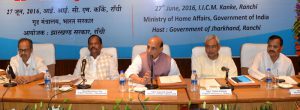 The Union Home Minister Shri Rajnath Singh chaired the 22nd meeting of the Eastern Zonal Council held at Ranchi, Jharkhand on Monday.
The Union Home Minister Shri Rajnath Singh chaired the 22nd meeting of the Eastern Zonal Council held at Ranchi, Jharkhand on Monday.
The meeting was attended by Shri Raghubar Das, Chief Minister of Jharkhand, Shri Nitish Kumar, Chief Minister of Bihar, Shri Pradip Kumar Amat, Minister for Finance, Odisha, Dr. Ashish Banerjee, Minister for Planning, West Bengal, Ministers from Bihar and Jharkhand and Senior Officers from the Central and State Governments. It was decided that the 23rd meeting of the Eastern Zonal Council will be held at Bhubaneswar in Odisha.
Shri Pradip Kumar Amat said, “The most important issue is the overall backwardness of the eastern region. Our country cannot progress and prosper cohesively unless the regional imbalances are taken care of. Union Government and NITI AYOG must prioritize this zone for overall development in key sectors of Health, Education, Communication, employment generation and tackling the extremist violence endemic in these states.”
“The de-linking of area development programs like Special Plan for KBK (Kalahandi-Bolangir- Koraput) Districts, Backward Region Grant Fund (BRGF) and Integrated Action Plan (IAP) for Left Wing Extremism affected Districts from Central assistance has seriously affected the socio economic development of the backward regions of the State. Considering the backwardness of the region special financial support may be provided by Government of India for area specific intervention for socio economic development of the region”, Amat added.
The Finance Minister stated, “Large tracts of tribal areas are not served by the banking sector. As a result the timely flow of benefits of government schemes do not reach the general public in these areas. Out of 6238 Gram Panchayats of the State, as many as 4597 GPs were identified as un-banked in 2014. During the last two years only 186 Bank branches have been opened. It is therefore, urged that the GoI may take suitable steps for opening of branches in each of the remaining 4411 unbanked gram panchayats of the State by March, 2019 for providing universal access to financial services”.
“As a move towards implementation of Goods & services Tax (GST), it was decided to phase out CST over a period of four years with annual reduction at the rate of 1%. It was decided by the Union Government to compensate the State Governments towards CST loss till implementation of GST. Due to the rate reduction in CST, the State is losing heavily on this account. From 2012-13 to 2014-15 the State has claimed Rs.2908.82 crore. We would, therefore, urge upon the Union Government to fully compensate the State for the CST loss”, Amat said on his speech.
